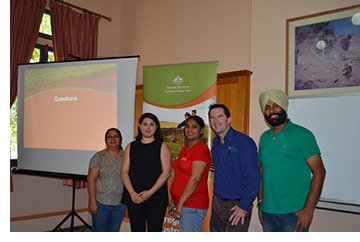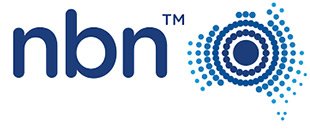-
Featured Items
-
Featured Resources
 Funding & Grants
Don't miss out on funding opportunities. Stay informed with our up to date online listings and email notifications.
Read More
Funding & Grants
Don't miss out on funding opportunities. Stay informed with our up to date online listings and email notifications.
Read More
 Skilled Migration
Our services help both applicants and employers, to learn more, develop plans, submit applications, and settle in.
Read More
Skilled Migration
Our services help both applicants and employers, to learn more, develop plans, submit applications, and settle in.
Read More
 Research and Analysis
Good research and analysis makes the case. How can our resources and services help your project or application?
Read More
Research and Analysis
Good research and analysis makes the case. How can our resources and services help your project or application?
Read More
 Information & Data Resources
With resources like REMPLAN, Regional Knowledge Base, and decades of data, discover how we can help your project.
Read More
Information & Data Resources
With resources like REMPLAN, Regional Knowledge Base, and decades of data, discover how we can help your project.
Read More
-
Stay InformedSubscribe to one or more of our regular email subscriptions, to be kept up to date on news and funding opportunities for the region
-
-
Our Region
- Our Region
- Regional Plan
- Regional Data
- Current Regional Issues
- Population Migration Analysis for 2016-21
- Job Vacancies Continue at All-Time High
- National Debt - What it Means for Our Economy?
- The True Value of Home Solar
- The Economic Impacts of Local Government Amalgamations
- State of the Regions Report 2014-15
- Antifragility - A different take on regional economic development
- Biohubs - Collaborative Waste Management
- Attracting New Residents
- Socio-Economic Impacts of the Murray Darling Basin Plan
- Murray Darling Basin Water Recovery
- Growing Businesses
- The Northern Inland Economy
- Geographical Overview
- Major Industry Sections
- Our Services
- Grants and Funding
-
Skilled Migration
- Skilled Migration
- Skilled Employer Sponsored Regional Visa
- Skilled Work Regional Visa (subclass 491)
- Temporary Seasonal Workers
- Designated Area Migration Agreement (DAMA)
- Helpful Information for Visa Holders
- Information for Employers
- Case Studies
- Payment Details
- Advice & Further Information
- Contact Details
- News & Events
-
Our Projects
- Our Projects
- Current Projects
- Skilled Migration
- Wool Works - Wool Training Schools
- Metal Works - Welding and Fabrication Schools
- Come On Inland
- Stories of Resilience
- Alt Brothers Beekeeping - Glen Innes
- Carelle's Toy Store - Glen Innes
- Greenhill Orchards - Arding
- Gwydir Meats - Warialda
- Kaputar Motors - Narrabri
- Moonbi General Store - Moonbi
- Sandstock - Tingha
- Sherelle Fashions - Tenterfield
- Sleepy Merino - Inverell
- Tenterfield Chamber of Toursim, Industry and Business - Tenterfeild
- The Welders Dog - Armidale
- Walcha Veterinary Supplies - Walcha
- AGCAP - Agribusiness Careers & Professions
- Northern Inland Regional Investment Profile
- Past Projects
- Digital Economy Strategy
- Business Growth Project
- Go Digital
- How to Start an Online Business
- Create Your Website Using Squarespace
- How to Edit Your Squarespace Site - Part 1
- How to Edit Your Squarespace Site Part 2
- Add a Shop to Your Squarespace Site
- Start a Blog and Find out What Customers are Searching
- 14 Tips For a Better Blog Post
- Which Social Media Platforms are Best for Your Business
- How to Use Facebook Effectively For Your Business – Part 1
- How to Use Facebook Effectively For Your Business – Part 2
- Instagram Tips for Business
- Catching Up, More Instagram & Dealing with Haters
- Getting Started with Twitter for Business
- Social Media Scheduling Tools
- How to Start an Etsy Shop – Part 1 – Research
- How to Start an Etsy Shop – Part 2 – Signup
- Online Security for Your Business
- Product Photography and Website Images: Your Guide
- 5 Tips to Improve your Productivity in your Business
- Best Online Business Resources
- How to Improve Your Communication Skills and Win More Clients
- NBN Coordinator
- Putting Power Back in the Regions
- Road Freight Study
- Town Audit Benchmarks
- Food and Wine
- Youth Survey
- Digital TV Switchover Assistance
- Northern Inland Transport Guide
- Live.Train.Work
- Northern Inland Innovation Awards
- Northern Inland Innovation Awards - 2017
- Northern Inland Innovation Awards - 2016
- Northern Inland Innovation Awards - 2015
- Northern Inland Innovation Awards - 2014
- Northern Inland Innovation Awards - 2013
- Northern Inland Innovation Awards - 2012
- Norther Inland Innovation Awards - 2011
- Prime Super Northern Inland Innovation Awards - 2010
- Prime Super Northern Inland Innovation Awards - 2009
- Northern Inland Innovation Awards - 2007
- Northern Lights Project
- NBN Smart Home
- Murray Darling Basin
- Moree Plains Business Workshops
- Namoi Investment Prospectus
- Industrial Land
- Bioenergy and Local Electricity Retailing
- Northern Inland Business Energy Assessment
- Skills for the Future
- Impacts of COVID-19 on Businesses
- Past Projects of NIRDB
- Aboriginal Employment and Enterprise in the Gunnedah Region
- Art as an Industry
- Aviation Survey
- Farm Forestry - Northern Inland Forestry Investment Group
- New England North West Film Strategy
- Northern Inland Excellence in Business Awards
- Food and Wine 2003 - 2008
- Prime Super Northern Inland Innovation Awards 2009
- Regional Business Networking Program
- Regional Leadership Course 2008
- Viticulture Strategy 2002-2003
- About Us
- Contact Us
- Other Resources
- Privacy and Legal
- Search
Back to Newsletters




March 2020 Newsletter
Tuesday 31st of March 2020
In this Issue
- Welcome from the Chair
- Figures to Alarm Government on Drought Impacted Businesses
- Financial Assistance for Individuals and Businesses Affected by COVID-19
- How to Keep Up to Date About COVID-19
- Home Affairs’ Tamworth Information Session Successful
- Increased Data Allowances for NBN Sky Muster Services
- How You Can Contribute to Regional Aviation
- Featured Grants and Funding Opportunities
Welcome from the Chair

Dear Northern Inlanders,
The resilience of our communities is being tested yet again with the impact on lives and livelihoods that Coronavirus is having in our region and beyond. Individuals and businesses are in a world of pain with many businesses having to close and employees losing their jobs. We face a massive challenge to protect the health of our communities whilst also keeping our economies viable, so that we may pick up the pieces once the threat of Coronavirus has passed. Be sure to regularly check our Coronavirus Assistance page to access the financial support that is available, as well as utilising the links to information in our article below. By looking out for each other and working together we will make it through this.
Although Coronavirus is at the forefront of our minds at the moment, it’s important we don’t forget the majority of our region is still drought declared and farming and non-farming businesses are still suffering from its effects. Let’s also not forget the bushfire recovery still occurring in many of our Local Government Areas. The results of the survey we conducted about the impact the drought is having on non-farming businesses is alarming, and they have been provided to our political representatives to show them that these impacts cannot remain underappreciated.
Regards,
Russell Stewart
Chair
Figures to Alarm Government on Drought Impacted Businesses

The worst drought in living memory has been a natural disaster in slow-motion and continues to have a devastating effect on the farming sector. However, the impacts on non-farm businesses in regional communities have been largely ignored and continued lack of action will be at the peril of smaller regional communities, according to Senior Research Economist David Thompson from RDANI.
In late 2019, RDANI conducted a survey of non-farm businesses to assess the impacts and survival responses, and to seek views on the forms of government assistance preferred by businesses. Such is the hidden struggle for local business people that they were eager to tell their stories, with 439 non-farm businesses in the Northern Inland region of NSW responding. “A broad spectrum of industries were represented in the survey but the strongest representation was from the retail sector, which comprised close to 25 percent of respondents,” Mr. Thompson said.
“Our regional economies are tied to the land. The drought has starved our farms and water supplies but the flow-on impacts experienced by non-farm businesses has been more direct and stark than appreciated to date.”
In the 2018-19 financial year, 16 percent of the Northern Inland region’s non-farm businesses surveyed experienced a turnover reduction of 51-100 percent, over one-quarter reported a turnover reduction of 31-50 percent, while one-third reported an 11-30 percent downturn.
“When you look at the participation our region-wide survey attracted and the financial hit businesses took in one year, you see that the drought is really threatening the sustainability of many regional businesses, beyond the farm gates, depressing local economies in Northern Inland NSW and across Australia” said Mr. Thompson.
The survey also quantified job losses in drought impacted regional economies. While 47 percent of respondents managed to retain all staff in 2018-19, 36 percent reduced staff by one or two and 15 percent by three or more. Only two percent achieved job growth. Surveyed businesses also reflected these figures in their expectations for 2019-20.
Drought survival strategies among Northern Inland businesses have been varied but there have been common themes. “We’ve seen over three-quarters of businesses reducing operating costs, yet that can also cut back their operational capacities. More than one-quarter have diversified into new markets or products, while almost 20 percent have had to rely on financial assistance from family or friends. Debt burdens have increased, making recovery from the drought impacts all the more challenging,” Mr. Thompson said.
We received practical insights from local business people on the kind of support they would like to see from Government. “Almost half want to see zero interest loans. Tax averaging was sought by 39 percent, Council rates reductions by 51 percent, payroll reductions by 43 percent, income equalisation deposits by 32 percent, fortnightly household support payments by 46 percent, funding for training, courses and professional advice by 30 percent and healthcare card eligibility by 35 percent of surveyed businesses,” he said.
Full details on the results of the survey are available on our website.
Financial Assistance for Individuals and Businesses Affected by COVID-19
The Australian Government has announced two rounds of financial support for individuals, businesses, not for profits and charities this month, with more on the way.
To help you access the support that is available to you, we are updating our specialised Coronavirus (COVID-19) Assistance page on our website almost daily. On this page you can find out about the range of programs that are available, including:
For Individuals:
- Changes to the JobSeeker and Youth Allowance JobSeeker Payments
- Lower-Income Support Payment
- Income Support Supplement for Individuals
- Additional Child Care Subsidy
- Temporary Early Release of Superannuation
- Temporarily Reducing Superannuation Minimum Drawdown Rates
- Reducing Social Security Deeming Rates
For Businesses:
- JobKeeper Payment
- Increased Asset Write-Off Threshold
- Backing Business Investment
- Boosting Cash Flow for Employers
- Supporting Apprentices and Trainees
- Support for Existing Government Program Participants and Applicants
- SME Guarantee Scheme
- ATO Support
- Providing Temporary Relief for Financially Distressed Businesses
- Community Child Care Fund Special Circumstances COVID-19 Support
How to Keep Up to Date About COVID-19
With the information about Coronavirus (COVID-19) changing so frequently, it is difficult to stay abreast of the information while also implementing the changes we are all having to make to our lives. Below is a list of resources from reliable sources that you may find useful.
Coronavirus Australia Mobile App
Developed by the Australian Government, this app will provide you with information to help you stay informed, including a symptom checker, and is available in the Apple App Store or Google Play.
Statements from The Hon Scott Morrison MP
Details of the coronavirus measures and stimulus packages are available in copies of the media statements and press conference transcripts on the Prime Minister of Australia website.
Economic Response to the Coronavirus
The Australian Government has information regarding their economic stimulus packages for individuals and businesses on The Treasury Website.
Coronavirus (COVID-19) Symptom Checker
A step-by-step symptom checker for Coronavirus by the Australian Government is available through the Health Direct website.
Daily Updates on Confirmed Cases
NSW Health is providing daily updated information on the spread of Coronavirus, including information for individual Local Government Areas on the NSW Health website
Coronavirus Information in Your Language
SBS is providing an online portal of Coronavirus information in 63 languages on the SBS website.
Tips for Coping with Coronavirus
The Australian Government Department of Health website Head to Health has information on how to cope with the mental stress, and also links to other useful sites.
Home Affairs’ Tamworth Information Session Successful

Regional Development Australia Northern Inland was proud to facilitate a Skilled Migration Information Session delivered in Tamworth recently by Ms. Servet Brennan, a Regional Outreach Officer from the Australian Government Department of Home Affairs.
“It was great to see over 30 attendees from private and public sectors make the most of this opportunity,” RDANI Senior Skilled Migration & Project Officer Gary Fry said. “They heard the latest on skilled migration visas and also had their questions answered.”
Skilled Migration has been incredibly important for economic growth of our region; sometimes skilled migrants have been vital for continued functionality of a business or service. This has been demonstrated by our case study videos.
The Information Session gave our region access to the Department of Home Affairs that employers in the city can take for granted. The next Migration Outreach Officer visit will cater for University of New England staff and international students.
Increased Data Allowances for NBN Sky Muster Services

NBN Co has unveiled new measures to support increasing capacity and data demand for nbn satellite services in regional and remote Australia during the COVID-19 pandemic. They are offering these new measures to support retail service providers (RSPs) in passing on these benefits to their customers.
“Over the coming days and weeks, we are expecting a higher number of people in regional and remote communities across Australia to work from home and more children to be remotely school. In preparation for this greater demand for data and based on feedback from internet retailers and customers, we have decided to take this action to provide additional support for that expected increase in day-time usage expected to increase due to increased activity on the network. “ said Gavin Williams, NBN Co Chief Development Officer, Rural and Regional.
“Our enhanced nbn Sky Muster Plus plans will help Australians be more in touch with loved ones, work remotely, use internet banking, and access important health and education services. nbn will continue to closely monitor data usage together with internet retailers, and will seek to implement any additional measures required where available including monitoring of the peak times, to support customers during these uncertain times.
Customers on standard nbn Sky Muster services will have their data download limits increased significantly, while for customers on nbn Sky Muster™ Plus services, nbn will implement an increased range of applications that will not count towards monthly data quotas.
How You Can Contribute to Regional Aviation
The Australian Government has announced the development of a comprehensive Regional Aviation Policy Statement to form part of the Government’s commitment to securing economic growth across remote and regional Australia.
The Department of Infrastructure, Transport, Regional Development and Communications would like to invite relevant stakeholders to provide responses to the Regional Aviation Policy Issues Paper, so they can receive a broad range of views on the regional aviation needs of Australia.
The Issues Paper will assist the Government to review current policy settings and programs to ensure that they continue to adequately meet the needs of regional Australia and are responsive to future trends and opportunities.
Submissions can be made until the 17 of April 2020 and further details are available on the Regional Aviation Policy Statement page of the Department’s website. If you have any further queries or issues with this deadline, please contact regionalaviationpolicystatement@infrastructure.gov.au or call 02 6274 7064.
Featured Grants and Funding Opportunities
To help businesses and individuals affected by Coronavirus (COVID-19) access the available assistance we have created a dedicated Coronavirus Assistance page on our website. This page will be updated as details become available on the recently announced economic stimulus packages from the Australian and NSW Governments.
There is also wide range of assistance available for individuals, businesses and communities that have been affected by the ongoing drought and the recent bushfires. To help you access this support, we have created dedicated Drought Assistance and Bushfire Assistance pages on our website which are being updated reguarly.
Below are some featured grants and funding opportunities from the multitude of open grants listed in the Grants and Funding Opportunities area of our website. Our website is updated weekly with new listings and updates and all are applicable to our region, so it is a great resource if you are looking for funding for a specific project.
You can also sign up to our Business and Infrastructure Funding Opportunities and the Community Grants and Award Programs newsletters through the simple form located on the left-hand side of our website: www.rdani.org.au, to receive monthly summaries of currently open grants.
Closes: 20th of April 2020 (extended)
Value: Up to $300,000 depending on project area
Run By: NSW Government Office of Responsible Gambling
The NSW Government offers grants to communities across NSW to support the building, renovation and fit-out of infrastructure. Funding is available for arts and cultural infrastructure, sport and recreation infrastructure and projects that assist communities with essential infrastructure and disaster readiness.
Infrastructure Grants are made possible through the NSW Government’s Clubgrants Category 3 Fund, which reinvests a contribution from the state’s registered clubs gaming machine profits back into community projects.
To be eligible for funding, applications must meet eligibility conditions including, the project location, the applicant and project benefit, purpose and development status. There is also a requirement for local government applicants to match funding.
Infrastructure Grants can be used toward the costs of construction, alteration, renovation, completion and fit-out of buildings and community infrastructure in the following areas:
Arts & Culture: $50,000 to $200,000 available per project
Disaster Readiness & Community Infrastructure: $10,000 to $200,000 available per project
Sport & Recreation: $100,000 to $300,000 available per project
Closes: 29th of May 2020
Value: Up to $2 Million for LGAs
Run By: Australian Government Department of Infrastructure, Transport, Regional Development and Communications
The objectives of the Program are to increase the productivity and safety of heavy vehicle operations, including through the provision of driver fatigue management rest areas and the enhancement of heavy vehicle networks. In addition, livestock transport industry proposals, which improve heavy vehicle safety and productivity for specific livestock transport operations will also be eligible for funding, provided they are submitted by an eligible Council under the Drought Communities Programme Extension funding and associated with a public road.
Closes: 29th of May 2020
Value: Up to $2 Million for LGAs
Run By: Australian Government Department of Infrastructure, Transport, Regional Development and Communications
The objectives of the Program are to upgrade and replace bridges to enhance access for local communities and facilitate higher productivity vehicle access. All proposals, including those from councils identified as Category C under DRFA, are expected to meet program objectives to enhance local communities by improving access and facilitating higher productivity, as well as addressing the challenges of enduring changes in climate.
Related Pages







 Latest News
Latest News
